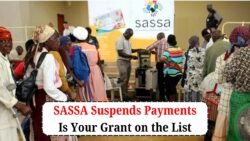
Latest News

Urgent: Apply for the R1,250 Foster Child Grant Before It Closes!

Who Will Receive the SASSA August Double Grant 2025? Discover the Full List of Beneficiaries

Unlock Your R370 SRD Grant for August 2025: A Step-by-Step Claim Guide

Discover Your SASSA Payment: Are You Receiving R2,315 or R560 This August 2025?

Don’t Miss Out: Apply Now for Foster Child Grant and Secure R1,250 Before the Deadline!

Is Your SASSA Grant at Risk? Thousands Already Suspended!

August 2025 Surprise: Who’s Eligible for the Extra SASSA Payments?

August 2025 SRD R370 Payment: Find Out Who’s Eligible for This Round!

August 2025 SASSA Update: Discover If You’re Eligible for R2,315, R560, or R1,250 This Month!

